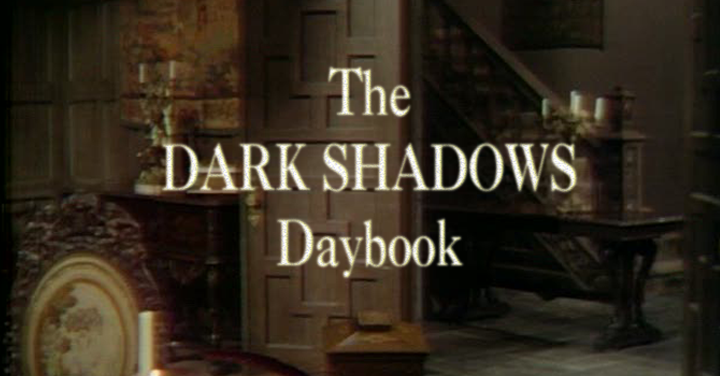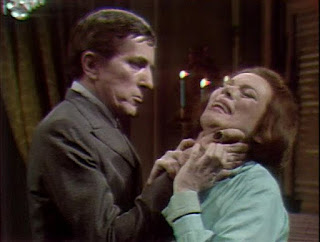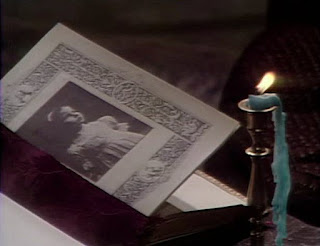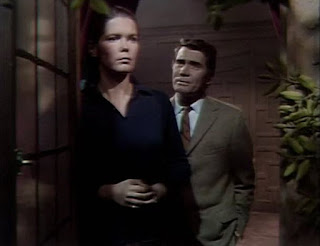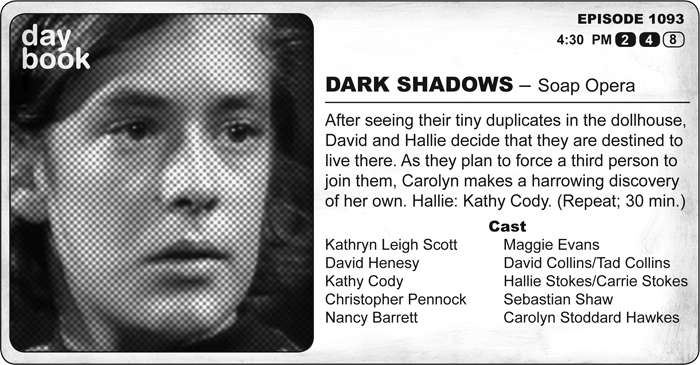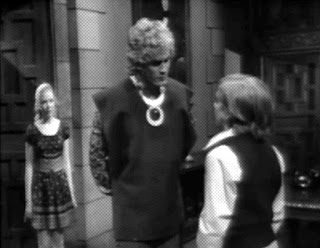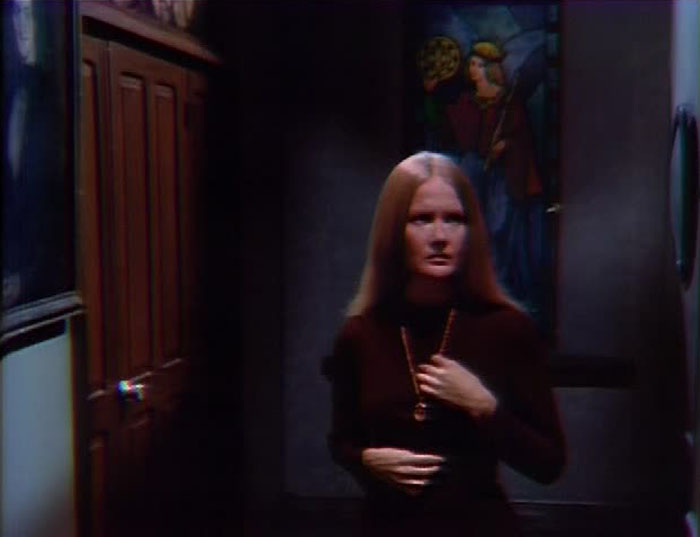
By PATRICK McCRAY
Taped on this day in 1970: Episode 1093
When David and Hallie prepare a new, sinister resident for the dollhouse, Sebastian confronts disturbing news about Maggie. Sebastian Shaw: Christopher Pennock. (Repeat; 30 min.)
There are stories that original audience members for the Universal FRANKENSTEIN and DRACULA occasionally had to be carried out on stretchers. While I’m sure that some of It Came from the Universal Publicity Office, I’m just as sure that other people were that authentically frightened by what they saw. It seems like an alien concept, now. To modern eyes, FRANKENSTEIN is more of a sad movie than a frightening one. DRACULA faces the same struggle, another film cursed by quaint. It happens. DARK SHADOWS is a similar victim to our evolving sense of horror.
Even as a kid, DARK SHADOWS was never scary to me. Maybe if I’d been younger -- six or seven. But I was eleven, and it was no KINGDOM OF THE SPIDERS. I loved it, though. If it wasn’t horror, it was its own genre, and whatever that genre was, I preferred it to anything not involving Klingons, barbarian women, or Jerry Reed driving at excessive velocities. Still, I always wondered what it would have been like to have been scared by DARK SHADOWS. In 2012, in broad daylight, I got the chance.
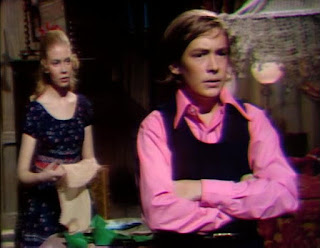 It’s the end of the prior episode, meaning it’s also at the beginning of this one, as David and Hallie look into the dollhouse of Rose Cottage. Their giant eyes loom over a vision of themselves sitting in the dollhouse in which Gerard intends to trap them forever. The juxtaposition was a disturbing, unexpected image. It has a strange, inexplicable logic which more closely approximates a dream than anything else I’ve seen on TV. That kind of citation is usually a cop-out, but there’s no other term for it. It’s a seemingly benign image with deeply, uncontrollably sinister implications. I know vampires don’t exist and I know that werewolves don’t exist. But dollhouses exist -- I used to build them. And what are dollhouses but an attempt to control a little world? That desire comes from somewhere. Thus, to see yourself -- not a doll of yourself, but yourself, hypnotically imprisoned in one as a willing victim? That’s a nightmare composed of elements all too familiar. It ties into why the pre-1840, Ragnarok sequence is so disturbing. It reeks of an inevitable doom knit partly out of the characters’ complicity in their own decay and partly out of their total inability to stop it. A vampire, you can stop. An invading ghost, you can stop. But a corruption like this to which you’re a willing participant? This is more quietly gothic than anything prowling around a graveyard in a cape and fangs by moonlight. This, for lack of a better term, is real.
It’s the end of the prior episode, meaning it’s also at the beginning of this one, as David and Hallie look into the dollhouse of Rose Cottage. Their giant eyes loom over a vision of themselves sitting in the dollhouse in which Gerard intends to trap them forever. The juxtaposition was a disturbing, unexpected image. It has a strange, inexplicable logic which more closely approximates a dream than anything else I’ve seen on TV. That kind of citation is usually a cop-out, but there’s no other term for it. It’s a seemingly benign image with deeply, uncontrollably sinister implications. I know vampires don’t exist and I know that werewolves don’t exist. But dollhouses exist -- I used to build them. And what are dollhouses but an attempt to control a little world? That desire comes from somewhere. Thus, to see yourself -- not a doll of yourself, but yourself, hypnotically imprisoned in one as a willing victim? That’s a nightmare composed of elements all too familiar. It ties into why the pre-1840, Ragnarok sequence is so disturbing. It reeks of an inevitable doom knit partly out of the characters’ complicity in their own decay and partly out of their total inability to stop it. A vampire, you can stop. An invading ghost, you can stop. But a corruption like this to which you’re a willing participant? This is more quietly gothic than anything prowling around a graveyard in a cape and fangs by moonlight. This, for lack of a better term, is real.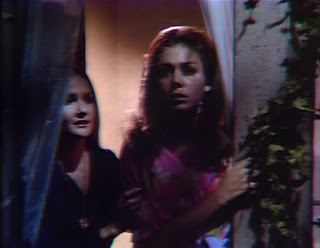 Part of the almost repellant sadness in this sequence is the sense of very believable surrender by the characters. David and Hallie (and even the future dollhouse resident, Carolyn) are abandoned children. This is underlined by the frequent absence of Roger and Liz, who were, even at their best, dysfunctional parents who only occasionally made up for it with sentimental speeches and half-hearted hugs. Worst of all is Maggie, also decaying and dissolute. After seeing her successfully fight the man for so long, she, also, just seems to be giving up. This is the closest to the actual world as the show got. Real people can’t be expected to thrive for years under such relentless indifference and abandonment, not to mention constant threats to life and limb. This sequence is an ugly wake-up call to the fact that living in a spook house isn’t glamor and cool lighting. Perhaps that’s why many who love the show have such a tough time with it. I have a tough time with it. At the same time, I know that there is a deeper reality being exposed. It’s a memo that DARK SHADOWS isn’t fun and games. Childhood ends, even as we descend deeper and deeper into the dollhouse. The sixties would end. Camelot would end. Thus, we are perfectly staged for the necessity of the 1840 sequence. We have to examine our pasts. We have to forgive. We have to ask more of ourselves and each other if we are ever to rebuild and return. We have to be the Barnabas, absolving Angelique. We have to be Angelique, looking past the smoke and mirrors of our shortcut parlor tricks to take responsibility for who we must become. If all good things come to an end, so do all bad things. Moments like these give the real dark shadows meaning, and we must fight to earn them.
Part of the almost repellant sadness in this sequence is the sense of very believable surrender by the characters. David and Hallie (and even the future dollhouse resident, Carolyn) are abandoned children. This is underlined by the frequent absence of Roger and Liz, who were, even at their best, dysfunctional parents who only occasionally made up for it with sentimental speeches and half-hearted hugs. Worst of all is Maggie, also decaying and dissolute. After seeing her successfully fight the man for so long, she, also, just seems to be giving up. This is the closest to the actual world as the show got. Real people can’t be expected to thrive for years under such relentless indifference and abandonment, not to mention constant threats to life and limb. This sequence is an ugly wake-up call to the fact that living in a spook house isn’t glamor and cool lighting. Perhaps that’s why many who love the show have such a tough time with it. I have a tough time with it. At the same time, I know that there is a deeper reality being exposed. It’s a memo that DARK SHADOWS isn’t fun and games. Childhood ends, even as we descend deeper and deeper into the dollhouse. The sixties would end. Camelot would end. Thus, we are perfectly staged for the necessity of the 1840 sequence. We have to examine our pasts. We have to forgive. We have to ask more of ourselves and each other if we are ever to rebuild and return. We have to be the Barnabas, absolving Angelique. We have to be Angelique, looking past the smoke and mirrors of our shortcut parlor tricks to take responsibility for who we must become. If all good things come to an end, so do all bad things. Moments like these give the real dark shadows meaning, and we must fight to earn them.
This episode was broadcast Sept. 2, 1970.

